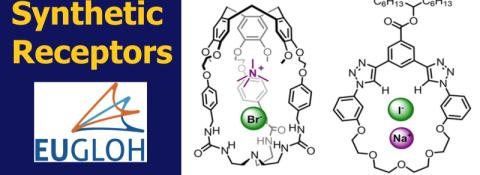
Synthetic Receptors
Online lectures will cover the principles for the whole spectrum of synthetic routes and their respective applications. These lectures are complemented by a hands-on workshop at the University of Porto (U.Porto), where students can observe various types of receptors in action, interact with advanced instrumentation, and engage directly in roundtables with lecturers from partner universities (University of Alcalá, University of Paris-Saclay, University of Lund and U.Porto).
This course is worth 3 ECTS credits.
Admission requirements:
Holding General Chemistry courses (minimum 15 ECTS), verifiable from official records.The ECTS metrics in use by FCUP will be used to assess this item.
- Being engaged or about to engage in research in the field of synthetic receptors or a relatable field, as confirmed by a supporting letter from the PhD supervisor.
The selection criterion is 'First come, first served', ensuring at least 2 spots for each of the 9 partners.
The support regarding travel and subsistence expenses for selected students enrolled in one of the partner Universities of the EUGLOH Consortium travelling to Porto will be covered by the EUGLOH Alliance.
Content and Methodology
Content:
Introduction and overview of synthetic receptors.
Principles of receptor design: shape, size, functionality, and environment considerations.
Types of synthetic receptors (e.g., traditional synthesis, molecular imprinting, bioengineered receptors, self-propelled receptors).
Characterisation Techniques.
Applications of Synthetic Receptors.
Future Perspectives and Ethical Considerations
Laboratory component.
Assessment and Feedback.
Online program (CET)
16th June – 14.30h-15.00h Course opening; 15.30-17.30h Class 1
17th June - 14.30h-17.30h Class 2
18th June – 14.30h-17.30h Class 3
25th June – 14.30h-18.30h Class 4
26th June - 14.30h-18.30h Class 5
27th June - 14.30h-18.30h Class 6
Presential program (Local time)
3rd July
10.00h-13.00h Lab;
14.30h-17.30h Lab.
4th July
10.00h-11.00h Roundtable I (Future perspectives, Ethical considerations);
11.00h-12.00h Roundtable II (Scientific project guidelines and student evaluation criteria);
14:30 - Visit to the Soares dos Reis National Museum promoted within the EUGLOH Cultural Corridor.
Methodology:
Multimodal Content Delivery: Lectures are available as both videos and transcripts, allowing students to choose their preferred format.
Accessibility Features: All videos are captioned, and text-to-speech options are provided for reading materials.
Regular Feedback: Ongoing feedback sessions help tailor the course to meet each student's needs
Assessment: Evaluation of a research proposal developed by the students for a novel study involving synthetic receptors, including background information, research questions, methodology, expected results, and potential impact.
Online lectures will cover the principles for the whole spectrum of synthetic routes and their respective applications. These lectures are complemented by a hands-on workshop at the University of Porto (U.Porto), where students can observe various types of receptors in action, interact with advanced instrumentation, and engage directly in roundtables with lecturers from partner universities (University of Alcalá, University of Paris-Saclay, University of Lund and U.Porto).
This course is worth 3 ECTS credits.
Admission requirements:
Holding General Chemistry courses (minimum 15 ECTS), verifiable from official records.The ECTS metrics in use by FCUP will be used to assess this item.
- Being engaged or about to engage in research in the field of synthetic receptors or a relatable field, as confirmed by a supporting letter from the PhD supervisor.
The selection criterion is 'First come, first served', ensuring at least 2 spots for each of the 9 partners.
The support regarding travel and subsistence expenses for selected students enrolled in one of the partner Universities of the EUGLOH Consortium travelling to Porto will be covered by the EUGLOH Alliance.
Content and Methodology
Content:
Introduction and overview of synthetic receptors.
Principles of receptor design: shape, size, functionality, and environment considerations.
Types of synthetic receptors (e.g., traditional synthesis, molecular imprinting, bioengineered receptors, self-propelled receptors).
Characterisation Techniques.
Applications of Synthetic Receptors.
Future Perspectives and Ethical Considerations
Laboratory component.
Assessment and Feedback.
Online program (CET)
16th June – 14.30h-15.00h Course opening; 15.30-17.30h Class 1
17th June - 14.30h-17.30h Class 2
18th June – 14.30h-17.30h Class 3
25th June – 14.30h-18.30h Class 4
26th June - 14.30h-18.30h Class 5
27th June - 14.30h-18.30h Class 6
Presential program (Local time)
3rd July
10.00h-13.00h Lab;
14.30h-17.30h Lab.
4th July
10.00h-11.00h Roundtable I (Future perspectives, Ethical considerations);
11.00h-12.00h Roundtable II (Scientific project guidelines and student evaluation criteria);
14:30 - Visit to the Soares dos Reis National Museum promoted within the EUGLOH Cultural Corridor.
Methodology:
Multimodal Content Delivery: Lectures are available as both videos and transcripts, allowing students to choose their preferred format.
Accessibility Features: All videos are captioned, and text-to-speech options are provided for reading materials.
Regular Feedback: Ongoing feedback sessions help tailor the course to meet each student's needs
Assessment: Evaluation of a research proposal developed by the students for a novel study involving synthetic receptors, including background information, research questions, methodology, expected results, and potential impact.